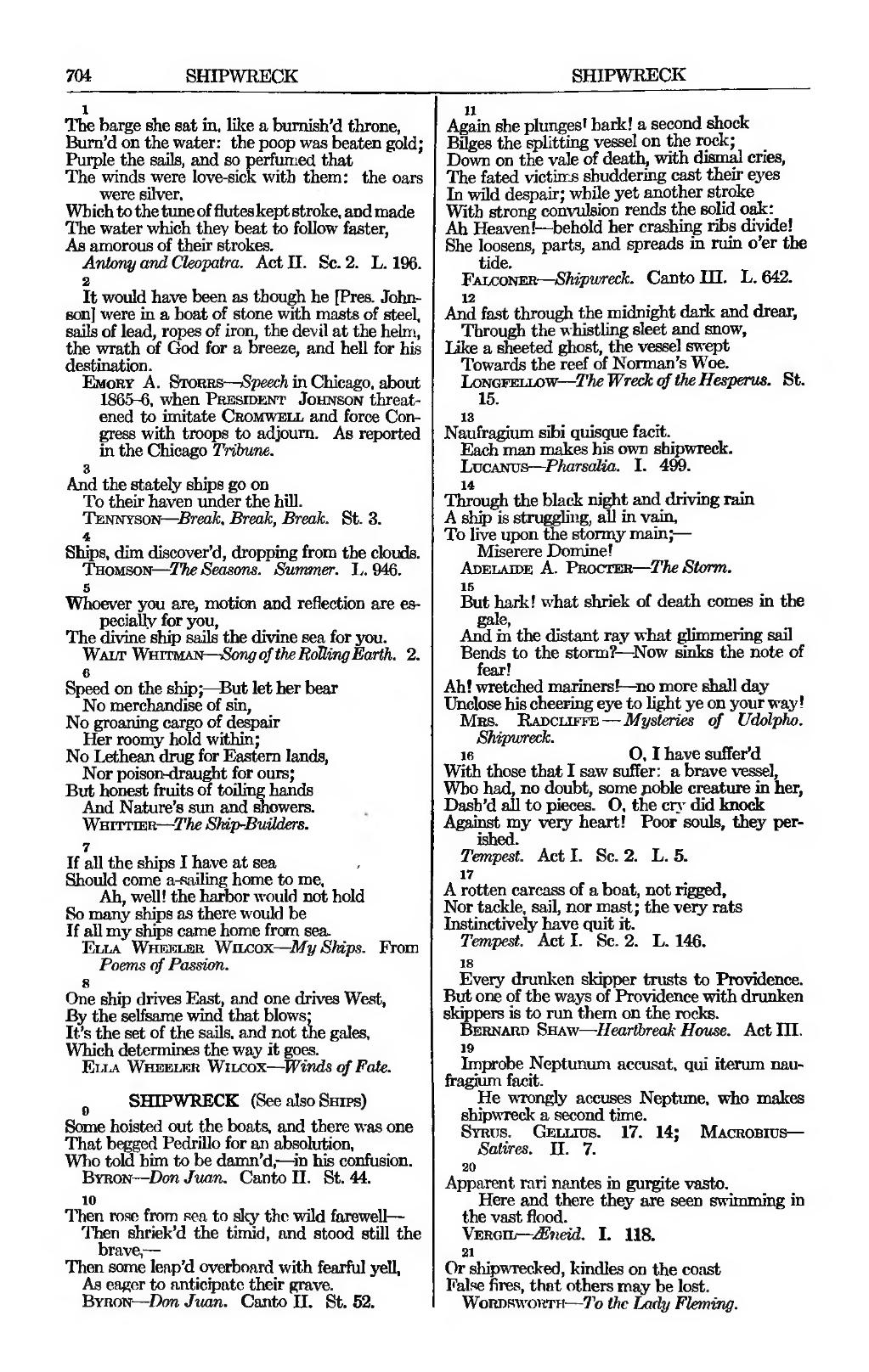The barge she sat in, like a burnish'd throne,
Burn'd on the water: the poop was beaten gold;
Purple the sails, and so perfumed that
The winds were love-sick with them: the oars were silver,
Which to the tune of flutes kept stroke, and made
The water which they beat to follow faster,
As amorous of their strokes.
It would have been as though he [Pres. Johnson] were in a boat of stone with masts of steel,
sails of lead, ropes of iron, the devil at the helm,
the wrath of God for a breeze, and hell for his
destination.
Emory A. Stobrs—Speech in Chicago, about
1865-6, when President Johnson threatened to imitate Cromwell and force Congress with troops to adjourn. As reported
in the Chicago Tribune.
And the stately ships go on
To their haven under the hill.
| author = Tennyson
| work = Break. Break, Break. St. 3.
Ships, dim discover'd, dropping from the clouds.
Thomson—The Seasons. Summer. L. 946.
Whoever you are, motion and reflection are especially for you,
The divine ship sails the divine sea for you.
Walt Whitman—Song of the Rolling Earth. 2.
Speed on the ship;—But let her bear
No merchandise of sin,
No groaning cargo of despair
Her roomy hold within;
No Lethean drug for Eastern lands,
Nor poison-draught for ours;
But honest fruits of toiling hands
And Nature's sun and showers.
Whittier—The Ship-Builders.
If all the ships I have at sea
Should come a-sailing home to me,
Ah, well! the harbor would not hold
So many ships as there would be
If all my ships came home from sea.
Ella Wheeler Wilcox—My Ships. From
Poems of Passion.
One ship drives East, and one drives West,
By the selfsame wind that blowsIt's the set of the sails, and not the gales,
Which determines the way it goes.
Ella Wheeler Wilcox—Winds of Fate.
SHIPWRECK
| seealso = (See also {{sc|Ships)
Some hoisted out the boats, and there was one
That begged Pedrillo for an absolution,
Who told him to be damn'd,—in his confusion.
| author = Byron
| work = Don Juan. Canto II. St. 44.
Then rose from sea to sky the wild farewell—
Then shriek'd the timid, and stood still the
brave,—
Then some leap'd overboard with fearful yell,
As eager to anticipate their grave.
| author = Byron
| work = Don Juan. Canto II. St. 52.
Again she plunges' bark! a second shock
Bilges the splitting vessel on the rock;
Down on the vale of death, with dismal cries,
The fated victims shuddering cast their eyes
In wild despair; while yet another stroke
With strong convulsion rends the solid oak:
Ah Heaven!—behold her crashing ribs divide!
She loosens, parts, and spreads in ruin o'er the
tide.
Falconer—Shipwreck. Canto III. L. 642.
And fast through the midnight dark and drear,
Through the whistling sleet and snow,
Like a sheeted ghost, the vessel swept
Towards the reef of Norman's Woe.
| author = Longfellow
| work = The Wreck of the Hesperus. St.
15.
Naufragium sibi quisque facit.
Each man makes his own shipwreck.
Lucanus—Pharsalia. I. 499.
Through the black night and driving rain
A ship is struggling, all in vain.
To live upon the stormy main;—
Miserere Domine!
Adelaide A. Procter—The Storm.
But hark! what shriek of death comes in the
gale,
And in the distant ray what glimmering sail
Bends to the storm?—Now sinks the note of
fear!
Ah! wretched mariners!—no more shall day
Unclose his cheering eye to light ye on your way!
Mrs. Radcliffe—Mysteries of Udolpho.
Shipwreck.
16 O, I have suffer'd
With those that I saw suffer: a brave vessel,
Who had, no doubt, some noble creature in her,
Dash'd all to pieces. O, the cry did knock
Against my very heart! Poor souls, they perTempest. Act I. Sc. 2. L. 5.
A rotten carcass of a boat, not rigged,
Nor tackle, sail, nor mast; the very rats
Instinctively have quit it.
Tempest. Act I. Sc. 2. L. 146.
| author =
| work =
| place =
| note =
| topic =
| page = 704
}}
{{Hoyt quote
| num = 15
| text = Every drunken skipper trusts to Providence.
But one of the ways of Providence with drunken
skippers is to run them on the rocks.
Bernard Shaw—Heartbreak House. Act III.
Improbe Neptunum accusat, qui iterum naufragium facit.
He wrongly accuses Neptune, who makes
shipwreck a second time.
Syrus. Gellius. 17. 14; Macrobius—
Satires. II. 7.
Apparent rari nantes in gurgite vasto.
Here and there they are seen swimming in
the vast flood.
Vergil—Æneid. I. 118.
Or shipwrecked, kindles on the coast
False fires, that others may be lost.
Wordsworth—To the Lady Fleming.

